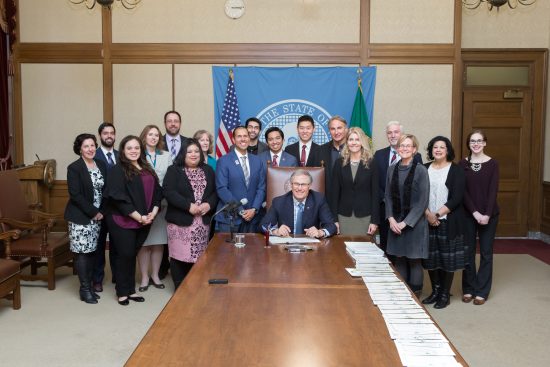OLYMPIA—This afternoon, Governor Jay Inslee signed into law the Student Opportunity, Assistance and Relief Act, or SOAR, aimed at reforming student loan practices to prevent high-cost debt as a result of accessing higher education.

Primary Sponsor: Tina Orwall
Under current law, in Washington state, professional licenses can be revoked when a person defaults on a student loan, thus taking away the ability to pay the loan. On top of that, 25 percent of a person’s income can be garnished, making it even harder for individuals to meet their payment obligations. In Washington, the default rate among student loan borrowers was calculated at 10.4 percent.
“As people struggle with mounting student loan debt it’s important that they have the resources to support their families,” said Rep. Tina Orwall, D-Des Moines, who sponsored House Bill 1169 to help alleviate some of the harsh penalties imposed on those who fall behind in their student loan payments. “This new law brings hard-working professionals relief by allowing them to keep their licenses and reducing the amount that can be garnished from their paychecks.”
The SOAR Act addresses student education loan debt, the repeal of statutes regarding professional license or certificate suspensions, private student loan default and exemptions for bank account and wage garnishments.
The Attorney General’s Student Loan Report of 2017, illustrates current trends, difficulties and vulnerabilities for Washington student loan borrowers and residents. Some of the AGO’s report findings include:
- Washington borrowers age 60 and over are on the rise, increasing by more than 35 percent in the last five years. Their student loan debt of $2.1 billion has nearly doubled, as has the delinquency rate, over the same time period.
- Women hold nearly two-thirds of outstanding national student loan debt, and are most likely to experience difficulties in repaying their debt.
- Students from low-income backgrounds are more likely to need student loans to attend higher education, and are more likely to have trouble repaying loans. Borrowers making less than $40,000 from 2006 to 2011 had a 35 percent default rate, while the rate of those making $60,000 to $80,000 was almost half that.
- Black graduates tend to have over $7,000 more debt upon graduation than their white classmates. Four years after graduation, that gap widens to nearly $25,000 more debt.
- Hispanic borrowers have about the same level of debt as white graduates, but are more than twice as likely to default.
Orwall’s bill, taking the AGO’s report recommendations into account, increases the amount of wages protected from garnishment to 85 percent, and the amount of funds in a bank account protected to $2,500, when the garnishment is for private student loan debt. These changes will allow borrowers who default to make payments on their obligations and ensure they can also pay for basic necessities such as groceries and rent.
The driving force behind this legislation came from a diverse and passionate group of stakeholders seeking to create common sense, cost-effective assistance and consumer protections for Washington’s student loan borrowers.
“No student or former student should lose their job, slip into poverty, become homeless, or even consider suicide because they can’t pay their student loan. This legislation will help student loan borrowers experiencing hardship continue to work and get back on track with their loans,” said Teri Thomson Randall, a lead stakeholder who spearheaded this effort with Rep. Orwall.
The Student Opportunity, Assistance and Relief Act had strong support from community members, advocates, organizations and agencies, including AARP; Assoc. Students of the UW & WSU; Assoc. of WA Businesses; Columbia Legal Services; College Success Foundation; Comm. on Hispanic Affairs; Dept. of Commerce; Dept. of Licensing; Faith Action Network; Independent Colleges of WA; Latino Civic Alliance; Natl. Assoc. of Social Workers; NW Justice Project; NW Progressive Institute; Office of the Attorney General; State Board for Community & Technical Colleges; Statewide Poverty Action Network; WA Education Assoc.; WA Homeownership Resource Center; WA Low Income Housing Alliance; WA State Housing Finance Comm.; WA State Labor Council; WA State Nurses Assoc.; WA Student Achievement Council; WA Student Association/Evergreen State College.
Punishing borrowers by taking away their ability to work in the field they specialized in can have devastating consequences for themselves, their families and even their communities. Orwall’s measure, instead, offers light at the end of the tunnel. It allows student debt holders the tools to keep working, which reduces stress and increases their quality of life, knowing they have the means to make steady payments and eventually pay off their debt.
